
Peter Agre, MD
Nobel Prize Laureate in Chemistry (2003)
Peter Agre, MD, studied chemistry at Augsburg College (BA 1970) and medicine at Johns Hopkins (MD 1974). After internal medicine residency at Case Western Reserve University Hospitals in Cleveland and oncology fellowship at the University of North Carolina at Chapel Hill, Agre joined the Johns Hopkins School of Medicine faculty in 1984 and rose to the rank of professor of biological chemistry and professor of medicine. In 2005, Agre joined Duke University School of Medicine as vice chancellor for science and technology and James B. Duke Professor of Cell Biology. Agre returned to Johns Hopkins in 2008, where he is a Bloomberg Distinguished Professor and director of the Malaria Research Institute, for which he oversees research in 15 laboratories in Baltimore and field research in Zambia, Zimbabwe, and Democratic Republic of Congo. Agre is widely recognized for discovering the aquaporins, a family of water channel proteins found throughout nature and responsible for numerous physiological processes in humans, including renal concentration, as well as secretion of spinal fluid, aqueous humor, tears, sweat, and release of glycerol from fat. Aquaporins have been implicated in multiple clinical disorders, including fluid retention, bedwetting, brain edema, cataracts, heat prostration, and obesity. Water transport in plants, lower organisms, and microbes including malaria parasites all involve aquaporins. In 2003, Agre shared the Nobel Prize in Chemistry with Roderick MacKinnon. Agre is a member of the National Academy of Sciences and the National Academy of Medicine, for which he chaired the Committee on Human Rights (2005-2008). From 2009-2011, Agre served as president of the American Association for the Advancement of Science and led science diplomacy visits to Cuba, North Korea, Myanmar, and Iran.
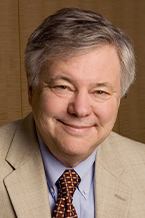
Michael S. Brown, MD
Nobel Prize Laureate in Medicine or Physiology (1985)
Michael S. Brown, MD, received a medical degree in 1966 from the University of Pennsylvania. He was an intern and resident at the Massachusetts General Hospital and a postdoctoral fellow with Earl Stadtman at the National Institutes of Health. He is currently Paul J. Thomas Professor of Molecular Genetics and director of the Jonsson Center for Molecular Genetics at the University of Texas Southwestern Medical School in Dallas. Brown and his colleague, Joseph L. Goldstein, MD, discovered the low-density lipoprotein (LDL) receptor, which controls cholesterol in blood and in cells. They showed that mutations in this receptor cause Familial Hypercholesterolemia, a disorder that leads to premature heart attacks. Their work laid the groundwork for drugs called statins that block cholesterol synthesis, increase LDL receptors, lower blood cholesterol, and prevent heart attacks. Statins are taken daily by more than 20 million people worldwide. Brown and Goldstein shared many awards for this work, including the U.S. National Medal of Science and the Nobel Prize in Medicine or Physiology. Brown served for 16 years on the board of directors of Pfizer, and he is currently a director of Regeneron Pharmaceuticals.

Kathleen A. Cooney, MD, MACP
Chair, Department of Medicine
Kathleen Cooney, MD, is the George Barth Geller Distinguished Professor of Medicine and chair of the Department of Medicine at Duke University School of Medicine, in Durham, North Carolina. She was recruited to Duke University in 2018 to become the tenth chair of the Department of Medicine. As chair of the Duke Department of Medicine, Cooney oversees the largest department in the School of Medicine. She continues to teach and mentor many clinical and laboratory trainees as well as faculty. Cooney is a medical oncologist focused on caring for men with prostate cancer and is internationally known for investigations examining the genetic epidemiology of prostate cancer. She discovered a recurrent mutation in the HOXB13 gene that increases the chances of being diagnosed with prostate cancer. Her current research focuses on identifying germline mutations associated with lethal and aggressive prostate cancer as well as prostate cancer in African American men. Cooney received her MD from the University of Pennsylvania Perelman School of Medicine in Philadelphia and completed her training in internal medicine and hematology/oncology at the University of Michigan. She previously served as chair of internal medicine at the University of Utah; before that, she served for nearly 10 years as the division chief of hematology/oncology and deputy director of the Comprehensive Cancer Center at the University of Michigan.

Victor Dzau, MD
President, National Academy of Medicine
Victor Dzau, MD, is president of the National Academy of Medicine (NAM) and vice chair of the National Research Council. He is chancellor emeritus and James B. Duke Distinguished Professor of Medicine at Duke University and is past CEO of Duke Health. Previously, he was chairman of medicine at Harvard and Stanford. Dzau has a highly decorated career as a physician-scientist, administrator, and leader. His seminal research in cardiovascular medicine laid the foundation for the class of lifesaving drugs known as ACE inhibitors. As inaugural president of the NAM, he leads a strategy of innovation and equity. Under his tenure, the NAM has launched important initiatives including the Global Health Risk Framework, Human Genome Editing Initiative, Global Roadmap for Healthy Longevity, and Grand Challenge in Climate Change, Health, and Equity. A leader in global health, Dzau launched the Duke Global Health Institute and Duke-NUS Medical School in Singapore. He serves on the Global Preparedness Monitoring Board, is advisor to the G20 High Level Panel on Financing for Pandemics, co-chaired the G20 Scientific Panel on Global Health Security, and is an advisor to the G7 Japan Health Task Force. His many honors include 18 honorary doctorates and honorary citizenship in Singapore.

Gary Gibbons
Director, National Heart, Lung, and Blood Institute
Gary Gibbons, MD, is the director of the National Heart, Lung, and Blood Institute (NHLBI), the third largest institute at the National Institutes of Health (NIH). NHLBI provides global leadership for the prevention and treatment of heart, lung, sleep, and blood diseases. Gibbons provides leadership for transformative NIH and NHLBI initiatives including the NIH Community Engagement Alliance Against COVID-19 Disparities, Researching COVID to Enhance Recovery, Implementing a Maternal health and Pregnancy Outcomes Vision for Everyone, and the NIH Climate Change and Health Initiative. Gibbons received the 2021 Service to America Medal for his visionary leadership of CEAL. He also pursues leading edge research at the National Human Genome Research Institute. His scientific contributions are cross-cutting in the fields of genomic medicine, vascular biology, and vascular pathogenesis as he investigates clinical phenotypes, behavior, molecular interactions, and social determinants of health in cardiovascular disease. He is a member of the National Academies of Science and has taught at Stanford University, Harvard Medical School, and at Morehouse School of Medicine, where he was the founding director of the Cardiovascular Research Institute. Gibbons received his BA from Princeton University, graduated magna cum laude from Harvard Medical School, and completed his residency and cardiology fellowship at Brigham and Women’s Hospital.

Joseph L. Goldstein, MD
Nobel Prize Laureate in Physiology or Medicine (1985)
Joseph L. Goldstein, MD, is chair and Regental Professor of the Department of Molecular Genetics at the University of Texas Southwestern Medical Center. He and his colleague, Michael S. Brown, MD, discovered the low density lipoprotein (LDL) receptor and worked out how these receptors control cholesterol homeostasis. At the basic level, this work opened the field of receptor-mediated endocytosis, and at the clinical level it helped lay the conceptual groundwork for development of the statin drugs that lower blood LDL-cholesterol and prevent heart attacks. Goldstein and Brown shared many awards for this work, including the Lasker Award in Basic Medical Research (1985), the Nobel Prize in Physiology or Medicine (1985), and National Medal of Science (1988). More recently, they discovered the SREBP family of transcription factors and showed how these membrane-bound molecules control the synthesis of cholesterol and fatty acids through Regulated Intramembrane Proteolysis. For this work, Brown and Goldstein received the Albany Medical Center Prize in Biomedical Research (2003) and the Rolf Luft Award from the Karolinska Institute (2016). Goldstein is currently chair of the Lasker Awards Jury and is a member of the Board of Trustees of Howard Hughes Medical Institute, National Academy of Sciences, National Academy of Medicine, and Foreign Member of the Royal Society.

Helen H. Hobbs, MD
Professor of Internal Medicine and Molecular Genetics, University of Texas Southwestern Medical Center
Helen H. Hobbs, MD, is an investigator of the Howard Hughes Medical Institute at the University of Texas Southwestern Medical Center (UTSW) in Dallas, Texas. After attending Stanford University and Case Western Reserve Medical School, she trained in internal medicine and endocrinology at Columbia-Presbyterian and UTSW. She joined the UTSW faculty in 1987, where she is professor of internal medicine and molecular genetics and director of the McDermott Center for Human Growth and Development. Together with Jonathan Cohen, she has used human genetics to identify sequence variations of large effect sizes on levels of plasma LDL-cholesterol (ABCG5/ABCG8, LDLRAP, PCSK9, NPC1L1, ANGPTL3) and triglyceride (ANGPTL3,-4,-8). More recently, she discovered the two most impactful genetic risk factors for fatty liver disease (PNPLA3, TM6SF2). Gene identification is the starting point for studies that have elucidated pathways and processes altered by the defective genes she has identified. She is a member of the National Academy of Medicine, the American Academy of Arts and Sciences, and the National Academy of Sciences. She is recipient of The Breakthrough Prize in Life Sciences and the Harrington Prize for Innovation in Medicine.

Executive Vice President for Health Affairs, Duke University
Dean, Duke University School of Medicine
Chief Academic Officer, Duke Health
A nationally recognized leader in academic medicine, Mary E. Klotman, MD, is executive vice president for health affairs at Duke University, dean of the Duke University School of Medicine, and chief academic officer for Duke Health. Klotman was appointed as Duke’s first executive vice president for health affairs in June 2023 and assumed her new role on July 1, 2023. She was named dean of the School of Medicine in January 2017 and was appointed to a second five-year term in 2022. Prior to her appointment as dean, Klotman served with distinction as chair of the Department of Medicine in the Duke University School of Medicine for seven years. Klotman earned her undergraduate and medical degrees from Duke University. She completed her internal medicine residency and a fellowship in infectious diseases in the Department of Medicine at Duke before joining the faculty as assistant professor of medicine. She joined the National Institutes of Health in 1991, where she was a member of the Public Health Service and trained and worked in the Laboratory of Tumor Cell Biology under the direction of Robert C. Gallo, MD. Before returning to Duke in 2010, Klotman joined Mount Sinai School of Medicine, where she was the Irene and Dr. Arthur M. Fishberg Professor of Medicine and served as chief of the Division of Infectious Diseases for 13 years. She was also co-director of Mount Sinai’s Global Health and Emerging Pathogens Institute. A pioneering physician-scientist, Klotman’s research interests are focused on the molecular pathogenesis of Human Immunodeficiency Virus 1 (HIV-1) infection. Among many important contributions, Klotman and her team demonstrated that HIV resides in and evolves separately in kidney cells, a critical step in HIV-associated kidney disease. Most recently, her group has been defining the role of integrase-defective lentiviral vectors for the delivery of an HIV vaccine. Klotman is a councilor of the Association of American Physicians and past president of the Association of Professors of Medicine. She was elected to membership in the Academy of Medicine in 2014. Klotman is a former president of the Duke Medical Alumni Association and received a Duke University School of Medicine Distinguished Alumni Award in 2015.

Brian Kobilka, MD
Nobel Prize Laureate in Chemistry (2012)
Brian Kobilka, MD, is the Hélène Irwin Fagan Chair in Cardiology at Stanford University School of Medicine. He
received bachelor of Science degrees in biology and chemistry from the University of Minnesota, Duluth, in 1977. He graduated from Yale University School of Medicine in 1981 and completed residency training in internal medicine at the Barnes Hospital, Washington University School of Medicine, St. Louis, Missouri, in 1984. From 1984-1989 he was a postdoctoral fellow in the laboratory of Robert Lefkowitz, MD, at Duke University. In 1990 he joined the faculty of medicine and molecular and cellular physiology at Stanford University. Research in the Kobilka lab focuses on the structure and mechanism of action of G protein coupled receptors (GPCRs). He is a member of the National Academy of Sciences, the National Academy of Medicine, and the American Academy of Arts and Sciences. In 2012, Kobilka was awarded the Nobel Prize in Chemistry with Robert Lefkowitz for their work on GPCRs.
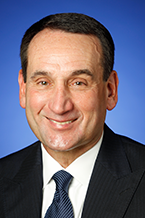
Mike Krzyzewski
Former Head Coach, Duke University Men’s Basketball
Mike Krzyzewski, who led the Duke University men’s basketball team for 42 years and coached Team USA to three Olympic gold medals, is a master motivator of teams, individuals, and organizations. A member of the Naismith Memorial Basketball and the National Collegiate Basketball Halls of Fame, “Coach K” is perhaps the most accomplished basketball coach in history. He led Duke to five national championships and holds innumerable records, including most NCAA Division 1 victories, most Final Fours, and most NCAA Tournament Victories. A 12-time National Coach of the Year, Coach K is the author of two New York Times best-selling books, including “Beyond Basketball: Coach K’s Keywords for Success.” Krzyzewski is a professor of the practice of leadership at the Fuqua School of Business at Duke and co-founder of the Coach K Center on Leadership and Ethics, which has influenced the leadership development of more than 6,500 MBA students and executives since 2004.

Robert Lefkowitz, MD
Nobel Prize Laureate in Chemistry (2012)
Robert Lefkowitz, MD is the Chancellor’s Distinguished Professor of Medicine and Professor of Biochemistry and Chemistry at Duke University. He has been an Investigator of the Howard Hughes Medical Institute since 1976. Lefkowitz was born on April 15, 1943, in The Bronx, New York. After graduating from the Bronx High School of Science in 1959, he attended Columbia College, from which he received a bachelor of arts in chemistry in 1962. He graduated from Columbia University College of Physicians and Surgeons in 1966 with a medical degree. After serving an internship and one year of general medical residency at Columbia Presbyterian Medical Center, he served as clinical and research associate at the National Institutes of Health as a commissioned officer in the United States Public Health Service from 1968 to 1970. Upon completing his medical residency and cardiology fellowship in 1973 at the Massachusetts General Hospital in Boston, he joined the faculty at Duke. Lefkowitz studies receptor biology and signal transduction and is best known for his detailed characterizations of the sequence, structure, and function of the β-adrenergic and related receptors and for the discovery and characterization of the two families of proteins which regulate them, the G protein-coupled receptor (GPCR) kinases and β-arrestins. Today, up to 30 percent of all prescription drugs are designed to “fit” like keys into the similarly structured locks of Lefkowitz’ receptors — everything from antihistamines to ulcer drugs to beta blockers that help relieve hypertension, angina, and coronary disease. He has been elected to the National Academy of Sciences and National Academy of Medicine as well as the American Academy of Arts and Sciences. Among many awards, he has received the Gairdner Foundation International Award, the American Heart Association’s Basic Research Prize and its Research Achievement Award, the Albany Medical Center Prize in Medicine, the Shaw Prize in Life Science and Medicine, the National Medal of Science, and the Nobel Prize in Chemistry in 2012, which he shared with his former trainee Brian Kobilka, MD.

Roderick MacKinnon, MD
John D. Rockefeller Jr. Professor, Rockefeller University
Roderick MacKinnon, MD, is the John D. Rockefeller Jr. Professor and head of the Laboratory of Molecular Neurobiology and Biophysics at Rockefeller University and an investigator at the Howard Hughes Medical Institute. His research has aimed to understand the molecular mechanisms of a class of integral membrane proteins known as ion channels. He received a BA from Brandeis, an MD from Tufts University, and trained in internal medicine at Beth Israel Hospital, Harvard Medical School. Over the past 30 years his laboratory provided the first atomic structures of selective ion channels, which have revealed the chemical basis of potassium and chloride ion selectivity. His lab has also determined the atomic structures and discovered mechanisms of voltage-, G-protein-, lipid-, Ca2+- and mechanical force-gated ion channels, all of which underlie the complex electrical signals produced by living cells. His current research is focused on understanding the rules governing interactions between molecules on the cell membrane.
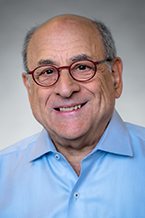
Stuart H. Orkin, MD
David G. Nathan Distinguished Professor of Pediatrics, Harvard Medical School
Stuart H. Orkin, MD, is the David G. Nathan Distinguished Professor of Pediatrics at Harvard Medical School and a Howard Hughes Medical Institute Investigator at Boston Children’s Hospital. Orkin has defined the molecular basis of human blood disorders and mechanisms governing blood cell development. He served as chairman of the Department of Pediatric Oncology at the Dana Farber Cancer Institute from 2000-2016. He received a bachelor of science from Massachusetts Institute of Technology and his medical degree from Harvard Medical School. He provided the first comprehensive molecular dissection of an inherited disorder (the thalassemia syndromes), and characterized genes responsible for other human blood disorders, including X-linked chronic granulomatous disease. Orkin identified the first hematopoietic transcription factors and characterized their roles in blood cell development and cancer. His studies of BCL11A, a repressor of fetal hemoglobin, have elucidated the regulation of globin gene switching and led to novel genetic therapies of the thalassemias and sickle cell disease. Orkin is an elected member of the National Academy of Sciences (NAS), National Academy of Medicine, American Academy of Arts and Sciences, and the American Philosophical Society. He has been recognized with awards including the Warren Alpert Prize; Distinguished Research Award from the Association of American Medical Colleges; E. Donnall Thomas, Dameshek and Basic Science Mentor Awards of the American Society of Hematology; Jessie Stevenson Kovalenko Medal of the NAS; William A. Allan Award of the American Society of Human Genetics; George M. Kober Medal of the American Academy of Pediatrics; Mechthild Esser Nemmers Prize in Medical Science; King Faisal Prize in Medicine; Harrington Prize for Innovation in Medicine; Gruber Prize in Genetics; and Canadian Gairdner International Award.

Vincent Price, PhD
President, Duke University
Vincent Price, PhD, is the 10th president of Duke University, where he is also the Walter Hines Page Professor of Public Policy and Political Science in the Sanford School of Public Policy and Trinity College of Arts and Sciences. A leading global expert on public opinion, social influence, and political communication, and former editor-in-chief of Public Opinion Quarterly, Price came to Duke in 2017. Since arriving on campus, he has turned his attention to the future of the university, developing a strategic vision focused on five core principles: empowering people, transforming education, building community, forging partnerships, and engaging a global network. He has also overseen a series of major new initiatives at Duke — including a comprehensive commitment to racial equity, continued strategic advancement of the arts, implementing next-generation residential programs, investing in Duke science and technology, and broadening and deepening engagement with Durham and the surrounding region. Prior to coming to Duke, Price served as provost of the University of Pennsylvania and was the Steven H. Chaffee Professor in the Annenberg School for Communication and Professor of Political Science in the School of Arts and Sciences. A member of the American Academy of Arts and Sciences, he earned his PhD (1987) and master of arts (1985) in communication from Stanford University and a bachelor of arts, graduating magna cum laude, in English from the University Honors Program at Santa Clara University (1979). Born and raised in southern California, Price and his wife Annette are the proud parents of two adult children. In their free time, they can often be found walking their doodles, Cricket and Marlowe, on the Al Buehler Trail in Duke Forest.
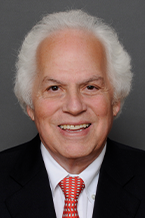
Stanley B. Prusiner, MD
Nobel Prize Laureate in Physiology or Medicine (1997)
Stanley B. Prusiner, MD, is director of the Institute for Neurodegenerative Diseases and professor of neurology and biochemistry at the University of California San Francisco. He received his bachelor of arts in chemistry in 1964 and his medical degree in 1968 from the University of Pennsylvania. Prusiner discovered an unprecedented class of pathogens that he named prions. Prions are proteins that acquire an alternative shape that becomes self-propagating. As prions accumulate, they cause neurodegenerative diseases in animals and humans. Prusiner proposed that the more common neurodegenerative diseases including Alzheimer’s and Parkinson’s diseases may be caused by prions. A wealth of evidence continues to accumulate arguing that prions cause not only these common degenerative diseases, but also the frontotemporal dementias (FTDs), chronic traumatic encephalopathy (CTE), multiple system atrophy (MSA), and dementia with Lewy bodies (DLB). Much of Prusiner’s current research focuses on developing therapeutics that reduce the levels of the specific prions responsible for MSA, DLB, and some FTDs, as well as CTE. Prusiner’s contributions to scientific research have been internationally recognized. He is a member of the National Academy of Sciences and the National Academy of Medicine and the recipient of numerous prizes, including the Albert Lasker Award for Basic Medical Research in 1994; the Nobel Prize in Physiology or Medicine in 1997; and the United States Presidential National Medal of Science in 2009. Prusiner is the author of over 550 scientific research articles and 300 review articles and is the editor of 13 books on diseases caused by prions. Prusiner’s single-author book “Madness and Memory,” which chronicles his discovery of prions, received wide acclaim.
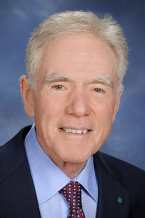
Ralph Snyderman, MD
Chancellor Emeritus for Health Affairs, Duke University
Ralph Snyderman, MD, is chancellor emeritus at Duke University, James B. Duke Professor of Medicine, and executive director of the Duke Center for Personalized Health Care. He served as chancellor for health affairs and dean of the Duke University School of Medicine from 1989 to July 2004 and led the transition of this excellent medical center into an internationally recognized leader of academic medicine. He oversaw the development of the Duke University Health System, one of the most successful integrated academic health care systems in the country and served as its first president and chief executive officer. Snyderman has played a leading role in the conception and development of personalized health care, an evolving model of national health care delivery. He has been widely recognized for his contributions to the development of more rational, effective, and compassionate health care. He was among the first to envision and articulate the need to move the current focus of health care from the treatment of disease-events to personalized, proactive, and patient-centered care. The Association of American Medical Colleges has referred to Snyderman as the “father of personalized medicine.” He is a member of the National Academy of Medicine and the American Academy of Arts and Sciences and is the recipient of numerous scientific and leadership awards.

Harold Varmus, MD
Nobel Prize Laureate in Physiology or Medicine (1989)
Harold Varmus, MD, co-recipient of the 1989 Nobel Prize in Physiology or Medicine for studies of the genetic basis of cancer, joined the Meyer Cancer Center of Weill Cornell Medicine as the Lewis Thomas University Professor of Medicine in April, 2015. He is also a senior associate member of the New York Genome Center, where he helps to develop programs in cancer genomics, and an adjunct professor at Columbia University where he teaches an undergraduate course about the scientific enterprise. Previously, Varmus was the director of the National Cancer Institute, president of Memorial Sloan-Kettering Cancer Center, and director of the National Institutes of Health. A graduate of Amherst College and Harvard University in English literature and of Columbia University in medicine, he was further trained at Columbia University Medical Center, National Institutes of Health, and the University of California San Francisco (UCSF), before becoming a member of the UCSF basic science faculty. Varmus, who is involved in several initiatives to promote science and health in developing countries, is a member of the National Academies of Sciences and Medicine, and serves on advisory groups for several academic, governmental, philanthropic, and commercial institutions. These positions include co-chair of the Mayor’s LifeSciNYC Initiative and member of advisory boards of the Broad and the Crick Institutes, the global health program at the Bill and Melinda Gates Foundation, and the biotechnology companies Surrozen and DragonFly. Most recently, he has become the chair of the World Health Organization’s new Science Council and co-chair of the National Academies’ Committee on Science, Technology, and the Law. The author of over 400 scientific papers and five books, including a 2009 memoir entitled “The Art and Politics of Science,” Varmus was a co-chair of President Obama’s Council of Advisors on Science and Technology (2009-10), a co-founder and chairman of the Board of the Public Library of Science (2003-2010), and chair of the Scientific Board of the Gates Foundation Grand Challenges in Global Health (2001-2003).
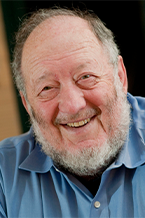
Irving Weissman, MD
Virginia & D.K. Ludwig Professor of Clinical Investigation in Cancer Research, Stanford University
Irving Weissman, MD, is the Virginia & D.K. Ludwig Professor of Clinical Investigation in Cancer Research and professor of pathology and developmental biology at Stanford University, where he is the director of the Stanford Institute of Stem Cell Biology and Regenerative Medicine along with Michael Longake. He is a pioneer of stem cell biology and its application to regenerative-medicine and cancer therapy. He accomplished the first isolation of blood-forming hematopoietic stem cells (HSC) in mice and human, the first HSC transplantation, determined the preleukemic progression in HSC leading to leukemia, identified CD47 on leukemic stem-cells and developed anti-CD47 antibodies as a macrophage-based cancer immunotherapy.
Event Organizers

Howard A. Rockman, MD
Edward S. Orgain Distinguished Professor of Cardiology
Professor of Medicine and Cell Biology
Director of the Duke Cardiovascular Research Center
Duke University
Howard Rockman is a physician-scientist whose research is focused on the molecular mechanisms of cardiac hypertrophy and heart failure with emphasis on the role of G protein-coupled receptors. He received his MD from McGill University in 1983, completed medical residency at the Montreal General Hospital in 1987 and in 1991, Cardiology Fellowship at the University of California, San Diego. His work led to a paradigm shift in scientists’ understanding of how the heart responds to pathological stresses. In addition, he pioneered the use of mouse models to study the molecular underpinnings of cardiac hypertrophy and was the first to develop a noninvasive means to measure cardiac function in Drosophila. His work has led to the development of new drug therapies to treat heart disease.
He has received a number of awards and honors, including the Burroughs-Wellcome Fund Award for translational medicine and the Distinguished Achievement Award from the American Heart Association. In 2015, he received the distinction of being named a Distinguished Scientist by the American Heart Association. In 2016, he received the Distinguished Faculty Award from the Duke Medical Alumni Association. He has been elected to both the Association of American Physicians and the American Society for Clinical Investigation. He has authored over 230 journal articles and is the former editor-in-chief of the Journal of Clinical Investigation, and founding editor and editor-in-chief of JCI Insight.
Dr. Rockman has trained more than 70 scientists and actively involved in the teaching of first year medical students and is recognized for his passion in mentoring young scientists and physicians. He is a recipient of both the Duke School of Medicine Research Mentoring Award and the prestigious Master Teaching Award.

Maria Rapoza, PhD
Associate Professor in Medicine
Dr. Rapoza is the Executive Director of the Duke University Cardiovascular Research Center (CVRC), a position she has held since late 2015. In this role, she provides executive management for cardiovascular research within Duke. Dr. Rapoza is also the Duke Department of Medicine contact for graduate medical trainees interested in basic research, and works on a number of physician scientist training initiatives including the R38 research during residency program. She previously was the Vice-President of Science and Technology at the North Carolina Biotechnology Center, where she led programs designed to strengthen research in North Carolina and developed great respect for and insight into the perspective and role of the funding agency as a thought leader. She holds a PhD in Biochemistry from Duke University and has served on various advisory groups and boards including the Triangle Global Health Consortium, REACH NC and the NC Association for Biomedical Research. Dr. Rapoza has worked throughout her career to strengthen systems for doing basic research.
